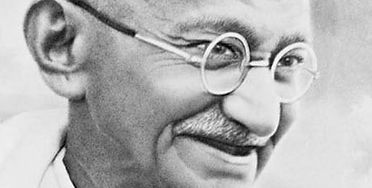
Gandhi
Mohandas Karamchand Gandhi was an Indian lawyer, anti-colonial nationalist and political ethicist who employed nonviolent resistance to lead the successful campaign for India's independence from British rule. He inspired movements for civil rights and freedom across the world. He was born on October 2, 1869 in Porbandar, India and assassinated on January 30, 1948 in Birla House, New Delhi, India.

Gandhian Principles
-
All life is one.
-
We each have a piece of the truth and the un-truth.
-
Human beings are more than the evil they sometimes commit.
-
The means must be consistent with the ends.
-
We are called to celebrate both our differences and our fundamental unity with others.
-
We reaffirm our unity with others when we transform “us” versus “them” thinking and doing.
-
Our oneness calls us to want, and to work for, the wellbeing of all.
-
The nonviolent journey is a process of becoming increasingly free from fear.
Satyagraha
Satyagraha is Gandhi’s word to describe the unitive power of Love and Truth that is at the root of all being and that can be unleashed to transform conflict and to create true peace, justice, and reconciliation. It can be defined as truth-holding, truth-having, or commonly, Soul Force. It is a process of waging a struggle for justice where we do not seek to conquer the opponent but – through love in action – to achieve a just resolution
Satyagraha combines two Sanskrit words: “sat” (meaning “truth,” “soul,” or “that which is”) and “agraha” (meaning “firm,” “steadfast,” “force”, “holding onto,” or “gripping”).

Gandhi
“Nonviolence is not only a negative state of harmlessness, but it is a positive state of love, of doing good even to the evildoer. But it does not mean helping the evildoer to continue the wrong or tolerating it by passive acquiescence.”

In Stride Toward Freedom, Dr. Martin Luther King, Jr. notes six of satyagraha’s most fundamental characteristics. In truncated form, nonviolent resistance (satyagraha):
-
IS ACTIVE and courageous, not passive and cowardly;
-
SEEKS RECONCILIATION, not victory over;
-
DISTINGUISHES injustice from person behaving unjustly;
-
requires the WILLINGNESS TO SUFFER without retaliating;
-
REJECTS physical and spiritual VIOLENCE (hate, ill-will, humiliation, deceit, etc.); and
-
is rooted in the conviction that the universe is on the side of JUSTICE AND TRUTH.